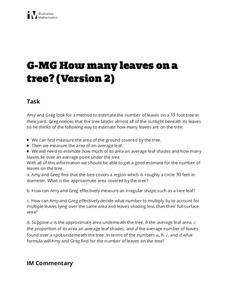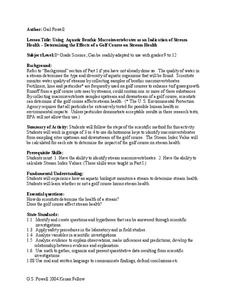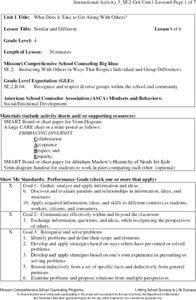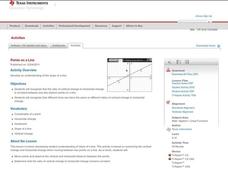Curated OER
Growing With Others, Kids on the Grow!
Students participate in an after school program that promotes accepting differences, self-motivation, teamwork, leadership roles, personal safety and self-responsibility, family unity and recognizing the characteristics of good...
Curated OER
Promoting Disability Awareness and Acceptance in Childhood
Create a safe and respectful school environment with the help of this special education teaching guide. Offering dozens of instructional ideas and activities for raising awareness and acceptance of children with disabilities, this is a...
Illustrative Mathematics
How Many Leaves on a Tree? (Version 2)
A second attack at figuring out the number of leaves on a tree, this activity makes both an excellent follow-up to version 1 and a stand-alone activity. Learners practice setting parameters and deciding acceptable estimate precision, and...
Kenan Fellows
Determining the Effects of a Golf Course on Stream Health
Do golf courses affect the water organisms in nearby streams and ponds? Small groups collect samples of water upstream and downstream from a golf course and analyze the macroinvertebrates found and the stream index values of...
Museum of Disability
Don't Call Me Special
Introduce young learners to the idea of disabilities and making friends with children who are different than they are. Using Don't Call Me Special - A First Look at Disability by Pat Thomas, learners are guided through the new...
Museum of Disability
Stand Tall, Molly Lou Melon
Help to create the next generation of friends with a lesson about accepting people who are different. As kids read Stand Tall, Molly Lou Melon, they answer a series of discussion questions and activities about making friends...
Museum of Disability
Don't Laugh at Me
You can prevent bullying in your classroom by addressing kindness, empathy, and acceptance with your littlest learners early on. After reading Don't Laugh at Me by Steve Seskin and Allen Shamblin, kids discuss the ways that words...
Missouri Department of Elementary
Similar and Different
Using a Venn diagram, pupils compare the similarities and differences between two classmates. Next, they review the CARE acronym (Collaboration, Acceptance, Respect, Empathy) and discuss how it applies to diversity in the classroom.
Curated OER
Growing on My Own, Kids on the Grow
Students participate in an after school program that promotes critical thinking, concern for others, recognizing differences, accepting differences, self-motivation and personal safety. They cover how kids develop, expressing different...
Curated OER
Exploring Tolerance and Related Essential Questioning on Acceptance and Diversity
Students explore the concept of diversity. They discuss ways in which people differ. Students visit various websites and discuss the vocabulary words found on these sites. They read stories from various countries and discuss the people...
Open Oregon Educational Resources
A Different Road To College: A Guide For Transitioning To College For Non-traditional Students
Registration. Prerequisite. Admission. Elective. With Alise Lamoreaux's informative eBook, A Different Road to College, prospective and current non-traditional college enrollees explore the language of college. They also learn...
Kenan Fellows
Effects of a Golf Course on Stream Health
Is the golf course causing issues in the stream? Find out with a resource that has groups perform chemical water tests to analyze the effects of a golf course on a stream. Pupils collect water above and below the course and analyze the...
WITS Program
Whoever You Are
Deep down, everyone is the same. Discuss the similarities and differences between people across cultures with a series of reading activities based on the beautiful story and illustrations in Whoever You Are by Mem Fox.
Curated OER
How Are We Different?
Students discuss the differences between boys and girls. In this acceptance lesson, students view pictures of boys and girls and use a Venn Diagram to chart their differences. Students discuss boy activities and girl...
abcteach
Flowers for Algernon, by Daniel Keyes
Looking for materials to accompany your study of Flowers for Algernon, by Daniel Keyes? Look no further! Included here is everything you need to go alongside your unit: worksheets, graphic organizers, writing assignments, an assessment,...
Teach Engineering
All About Linear Programming
Class members connect engineering with an understanding of linear programming using a technical resource. Scholars learn about linear programming (linear optimization) and how it applies to engineering design in the first of two modules....
Museum of Disability
Can You Hear a Rainbow?
Teach your class about compassion and empathy with Jamee Riggio Heelan's Can You Hear a Rainbow? As kids read about Chris, a boy who is deaf, they discuss the things he likes to do, as well as the ways he communicates with the world.
Curated OER
Ages in Stages: An Exploration of the Life Cycle based on Erik Erikson's Eight Stages of Human Development
Examine Erikson's chart on the various stages one goes through growing up. Individually, they write a paper on whether or not they fit into those categories and how they are different today. In groups, for each stage they role play the...
Curated OER
Credible Sources on the Internet: What to Trust, What to Dismiss and When to Cite a Source
Wait, you mean researchers don't all use Wikipedia? Teach your class about intelligent research with a lesson about evaluating digital sources. The lesson starts with a quickwrite and includes vocabulary exercises and several...
Curated OER
Growing in Communities, Kids on the Grow
Students participate in an after school program that promotes concern for others, recognizing differences, accepting differences, leadership roles, mentoring, self-responsibility and personal safety. They explore the diversity of their...
Curated OER
Physical Differences
Students role play what it would be like to have a physical disability. In this lesson on acceptance, students listen to the book A Rainbow of Friends by P.K. Hallinan. As a class, the students discuss similarities and differences in...
National Endowment for the Humanities
On This Day With Lewis and Clark
Walk in the footsteps of Lewis and Clark as they discover the wonders, beauty, and dangers of the American frontier. After gaining background knowledge about Thomas Jefferson and the Louisiana Purchase, young explorers use primary...
Curated OER
Points on a Line
How do you find slope? You use points on a line of course. slope. Teach your class how to calculate and differentiate between horizontal and vertical lines. They are sure to be pros at graphing lines on a coordinate plane by the end of...
Curated OER
Simple Inequalities on a Number Line
Students solve inequalities problems. In this algebra lesson, students graph the solution of inequalities on a number line. They discuss boundaries and open or closed intervals.

























